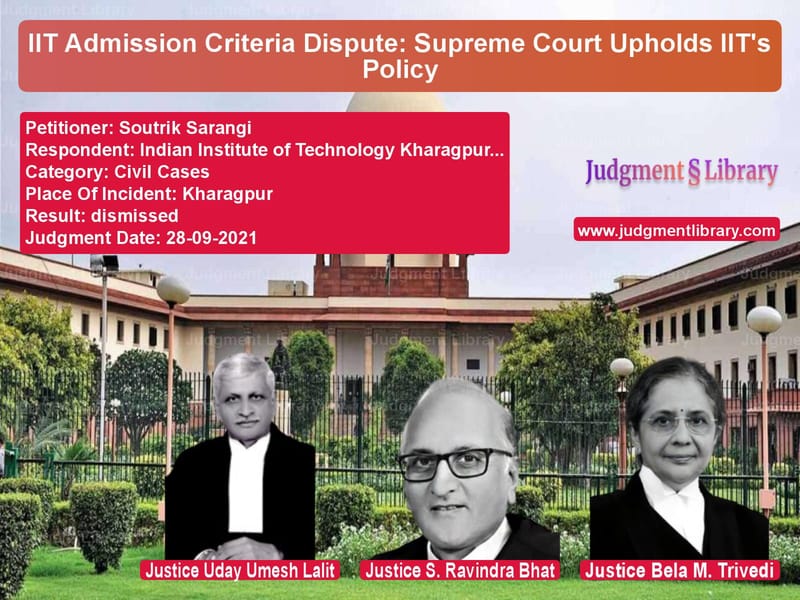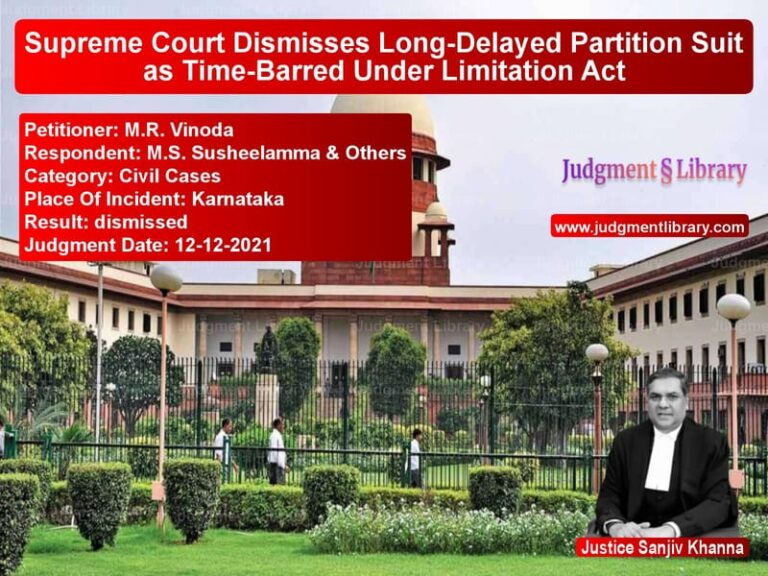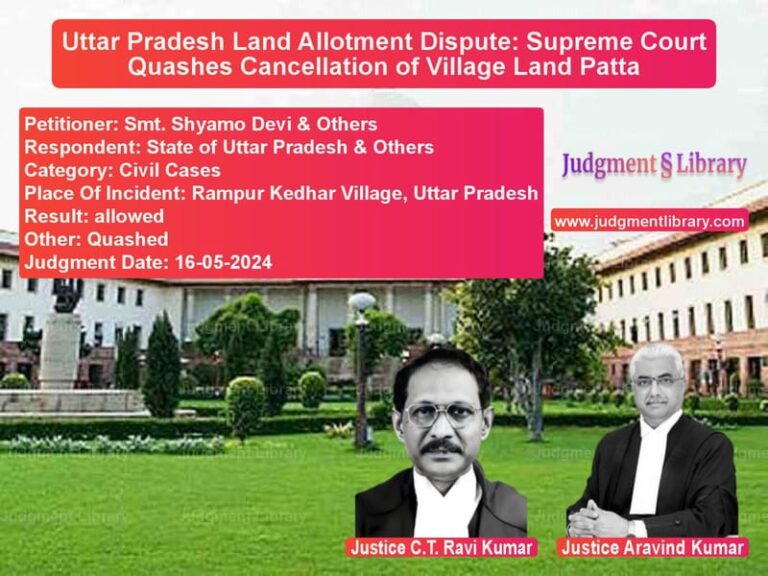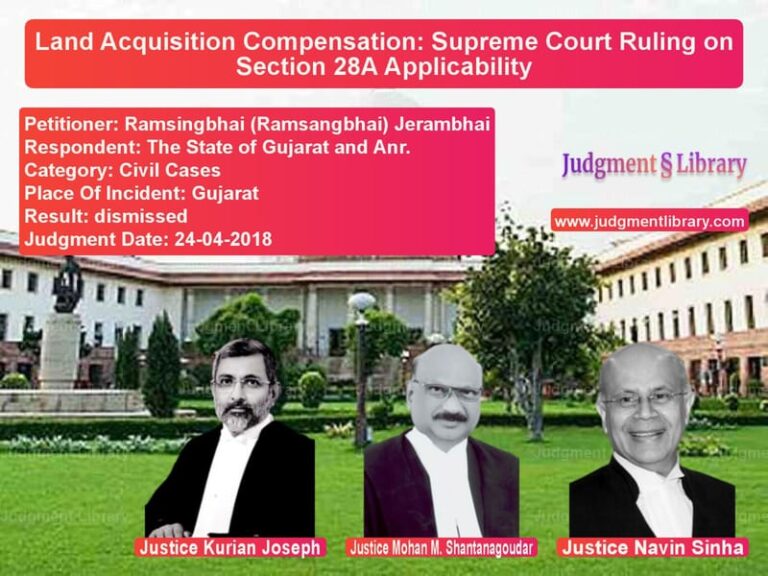IIT Admission Criteria Dispute: Supreme Court Upholds IIT’s Policy
The Supreme Court of India recently ruled on a contentious issue regarding admission eligibility criteria for the Joint Entrance Examination (JEE) Advanced. The case revolved around a challenge to the exclusion of candidates who had already secured admission in an Indian Institute of Technology (IIT) but wished to reappear for JEE Advanced to improve their prospects. The petitioner, Soutrik Sarangi, had contested the restrictive policy that prevented him from retaking the exam after securing admission to IIT Kharagpur.
The matter was first taken to the Calcutta High Court, where the single judge ruled in favor of Soutrik, declaring the exclusionary criterion as discriminatory. The Indian Institute of Technology (IIT) Kharagpur, aggrieved by the decision, appealed to the Supreme Court.
Background of the Case
Soutrik Sarangi had appeared for JEE Advanced 2020 and secured a rank that earned him admission to the Chemical Engineering Dual Course at IIT Kharagpur. However, he was not satisfied with his rank and sought to reappear for JEE Advanced in 2021 to gain admission into a preferred course, such as Computer Science. The eligibility criteria for JEE Advanced stipulate that candidates can attempt the exam only twice in consecutive years, provided they had not previously taken admission in any IIT.
Since Soutrik had accepted admission in IIT Kharagpur in 2020, he was deemed ineligible for JEE Advanced 2021. Contending that this restriction was arbitrary and discriminatory, he approached the High Court, arguing that students admitted to non-IIT institutions were allowed to reappear for the exam, whereas those admitted to IITs were barred.
Arguments Presented
Petitioner’s Arguments
- Soutrik’s counsel argued that Criterion 5 of the JEE Advanced eligibility rules unfairly differentiated between IIT-admitted students and those in non-IIT institutions.
- It was pointed out that regardless of whether a student secured admission in an IIT or a non-IIT institution, opting out of a course resulted in a wasted seat, making the restriction illogical.
- The petitioner contended that he had inadvertently missed the withdrawal deadline and should not be penalized for it, as it affected his educational prospects.
- He sought relief on the grounds that he had a fundamental right to pursue better educational opportunities.
Respondent’s Arguments
- The IITs contended that the eligibility rule was based on sound academic policy to prevent wastage of seats and maintain the integrity of the admission process.
- They highlighted that the rule had been in place for over five years and was designed to prevent candidates from using IIT seats strategically while attempting to secure a better rank the following year.
- It was argued that allowing students like Soutrik to retake the exam after securing an IIT seat would undermine the fairness of the admission system and create instability in the allocation process.
- The IITs also asserted that the Calcutta High Court had erred in equating IIT seats with non-IIT seats, as IITs are governed by specific statutory regulations.
Supreme Court’s Analysis and Judgment
The Supreme Court examined the rationale behind the eligibility criteria and found merit in IIT’s arguments. The court noted that the restriction was designed to ensure a fair and orderly admission process.
The Supreme Court emphasized:
“The courts are neither equipped nor have the academic or technical background to substitute themselves in place of statutory professional technical bodies and take decisions in academic matters involving standards and quality of technical education.”
The court further observed that the policy was formulated after careful deliberation and served a legitimate purpose of preventing manipulation of the admission process. It concluded that the classification of IIT-admitted students and non-IIT students was justified and upheld the validity of Criterion 5.
Ultimately, the Supreme Court overturned the High Court’s decision and dismissed Soutrik’s petition, ruling that he was not eligible to appear for JEE Advanced 2021.
Implications of the Judgment
- The ruling reaffirms the autonomy of IITs in setting and enforcing admission policies.
- It upholds the principle that courts should not interfere in academic policies unless they are manifestly arbitrary or unconstitutional.
- The decision reinforces the need for candidates to be mindful of eligibility rules before accepting admission to an IIT.
- Future aspirants must carefully consider their choices during the counseling process to avoid being disqualified from future attempts.
The Supreme Court’s verdict provides clarity on IIT admission rules and strengthens the credibility of the JEE Advanced selection process. It serves as a reminder that admission policies must be respected to ensure fairness and stability in one of the country’s most competitive academic selection systems.
Petitioner Name: Soutrik Sarangi.Respondent Name: Indian Institute of Technology Kharagpur & Ors..Judgment By: Justice Uday Umesh Lalit, Justice S. Ravindra Bhat, Justice Bela M. Trivedi.Place Of Incident: Kharagpur.Judgment Date: 28-09-2021.
Don’t miss out on the full details! Download the complete judgment in PDF format below and gain valuable insights instantly!
Download Judgment: soutrik-sarangi-vs-indian-institute-of-supreme-court-of-india-judgment-dated-28-09-2021.pdf
Directly Download Judgment: Directly download this Judgment
See all petitions in Education Related Cases
See all petitions in Judgment by Uday Umesh Lalit
See all petitions in Judgment by S Ravindra Bhat
See all petitions in Judgment by Bela M. Trivedi
See all petitions in dismissed
See all petitions in supreme court of India judgments September 2021
See all petitions in 2021 judgments
See all posts in Civil Cases Category
See all allowed petitions in Civil Cases Category
See all Dismissed petitions in Civil Cases Category
See all partially allowed petitions in Civil Cases Category







